
Employers want the best for their employees – health, happiness, financial wellness, career success, etc. One important measure all employers can take to help improve the quality of life of their workforce is to educate employees on the benefits of COVID-19 vaccination.
Vaccine hesitancy is understandable. Whether it’s a fear of needles or long-term side effects, employees who are still unsure about getting the COVID-19 vaccine have their own, very valid, reasons. We also know that unvaccinated individuals are approximately eight times more likely to get sick and 25 times more likely to be hospitalized or die from COVID-19.
It is an employer’s responsibility to share credible information with their workforce and encourage them to talk with their health care provider about making the best decision regarding vaccination. Here are five reasons employers should continue to educate their employees about the benefits of getting vaccinated:
Encourage vaccination to reach herd immunity.
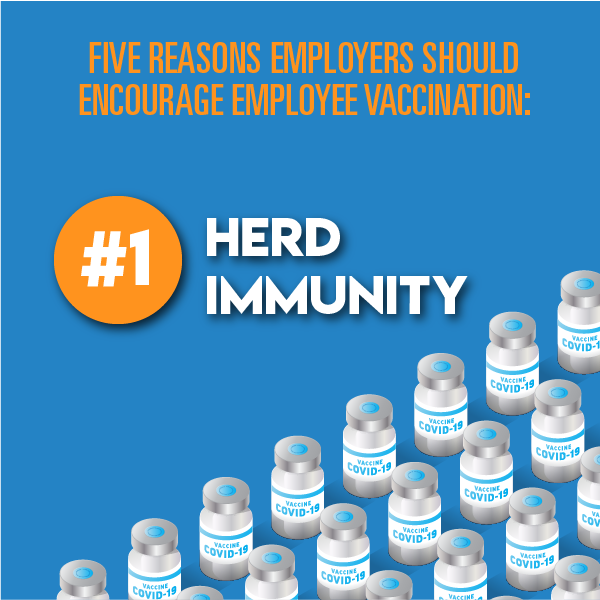
- Infectious disease experts estimate 70% of eligible Michigan residents will need to be vaccinated to reach herd immunity, or “community immunity.”
- Achieving herd immunity means enough of the community is resistant to a highly contagious disease. When herd immunity is reached, unvaccinated populations will be protected from contracting COVID-19 because transmission between those who are vaccinated occurs less often.
- In the city of Detroit, 41.1% of residents have received one dose of a COVID-19 vaccine as of Aug. 9, 2021. Vaccination rates for fully vaccinated Michigan residents in Southeast Michigan as of Aug. 10, 2021, are as follows:
| County | One Dose | Fully Vaccinated |
| Washtenaw County | 69.9% | 65.6% |
| Oakland County | 69.9% | 64.6% |
| Wayne County | 66.7% | 60.9% |
| Livingston County | 61.1% | 57.1% |
| Macomb County | 58.8% | 54.3% |
| St. Clair County | 51.5% | 48.0% |
| Monroe County | 45.9% | 42.3% |
- For recently reported vaccination rates, visit Michigan.gov’s COVID-19 Vaccination Coverage dashboard.
- Employers should keep their organization updated on the status of vaccination rates in their county to encourage employees to play their part in ending the effects of COVID-19 in their community.
Encourage vaccination to keep coworkers safe as your organization transitions back to the in-person workplace.
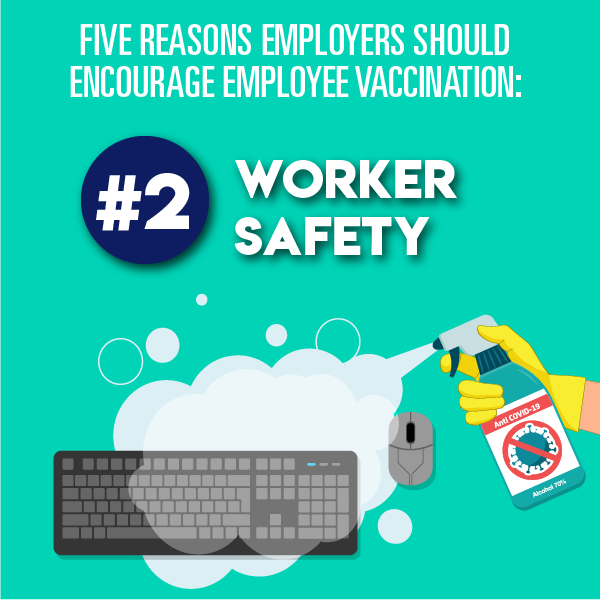
- Employees are feeling anxious about returning to the in-person workplace for several reasons, with fear of contracting COVID-19 being one of the most common.
- Consider implementing policies that help everyone visiting the workplace feel comfortable. This may include mandating the vaccine for employees if it makes sense for your industry or allowing only vaccinated employees into the workplace and at business events for the time being. Policies may also ask unvaccinated employees to continue working remotely to help ensure their safety and the safety of those returning to the office.
- Employers can choose whether they will require returning employees to provide proof of vaccination or go by the honor system.
- For more guidance on determining how to identify vaccinated employees from unvaccinated employees, download your complimentary Employer’s Guide to Reopening.
Encourage vaccination to ensure everyone gets the quality care they need.
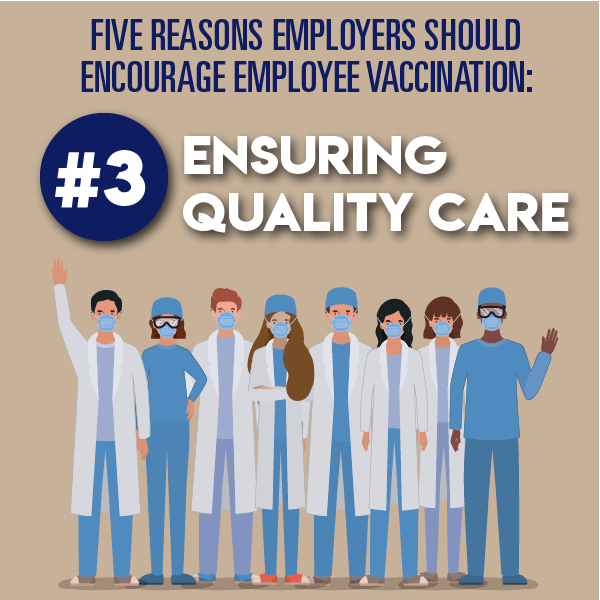
- The delta variant is expected to increase cases in the fall, and will likely impact hospital capacity. High hospital capacity means your workforce could have a harder time receiving the care they need for any reason – COVID-19 related or not.
- Annual appointments and preventative screenings are designed to catch symptoms of chronic illness early so that it can be properly treated.
- Postponed appointments due to high hospital capacity could put the health of everyone at risk. Keep your employees healthy and productive by encouraging vaccination.
Encourage vaccination to control the spread of the delta variant.
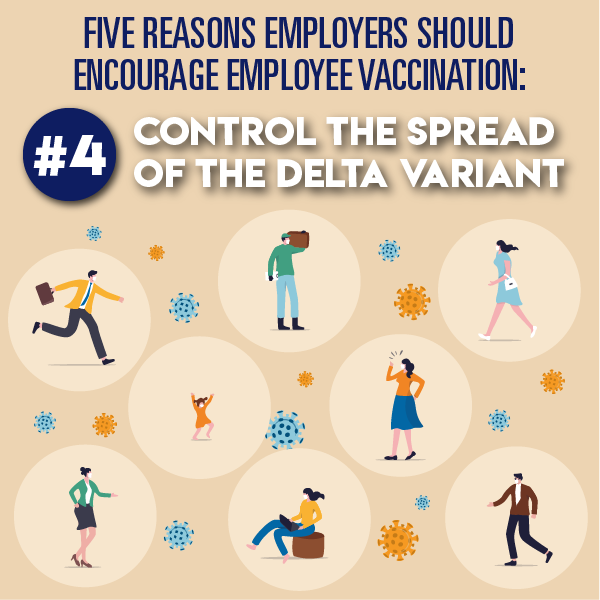
- The delta variant is the most contagious mutation seen yet. Unvaccinated populations are most at risk for serious illness caused by the variant.
- Health experts regard delta as more dangerous because it can spread quickly through unvaccinated populations. It is estimated that someone infected with the delta variant will spread the virus to three or four other people, compared to one or two other people through the original coronavirus strain.
- Employers should share these important facts with their workforce as a means of encouraging them to register for a COVID-19 vaccine to greatly reduce their chances of serious illness from the highly contagious variant.
Encourage vaccination to keep employees healthy as flu season approaches.
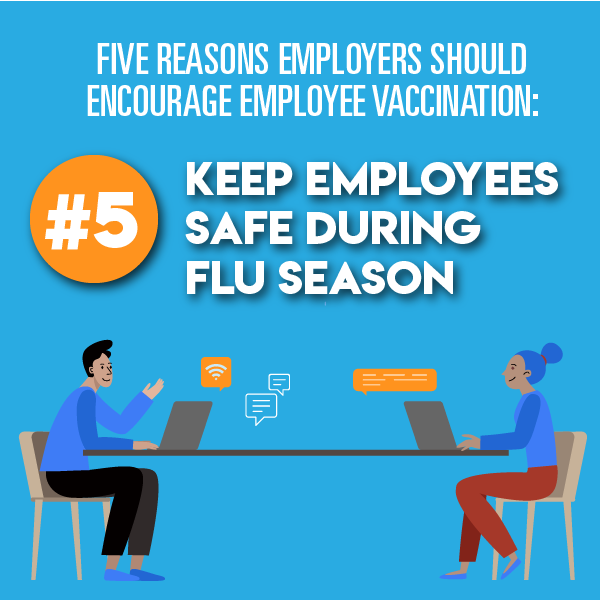
- The delta variant is expected to increase cases in the fall, and will likely impact hospital capacity. In addition, fall months are peak flu season.
- Keep your employees healthy, safe, and productive by encouraging vaccination for COVID-19 and the flu. Every flu season is different, but every year, millions get the flu, hundreds of thousands are hospitalized, and thousands to tens of thousands die from flu-related causes every year, according to the CDC.
- Combine that with the COVID-19 pandemic and employers can expect sick employees if a majority are unprotected from either disease.
The health of your employees determines the health of your business and the communities it serves. Help your employees and their families stay happy, healthy, and productive by sharing the benefits of getting vaccinated.
The Centers for Disease Control and Prevention (CDC) is working diligently to provide the best guidance to keep communities safe. For the most up-to-date guidance, visit the CDC website.
For a step-by-step resource on navigating COVID-19 vaccination discussions in the workplace, download your complimentary Employer’s Guide to Building Vaccine Confidence Within Your Workplace.